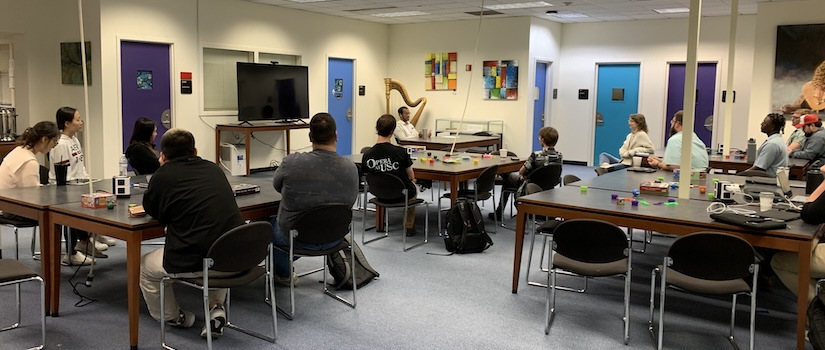Artificial Intelligence has the potential both to enhance and to undermine learning outcomes in ways that students and faculty alike continue to grapple with. A recent panel on AI in academic research and writing organized by Head of Music Library Dr. Ana Dubnjakovic gave students in the School of Music the opportunity to explore how they can benefit from AI and where it can get them into trouble.
Attended by some 20 students ranging from undergraduates to Ph.D. candidates, the April 24 panel featured Dubnjakovic herself along with piano professor Omar Roy, who is one of the fellows of the provost’s inaugural AI Teaching Fellowship. They fielded questions on topics ranging from acceptable use of Large Language Models (LLMs) in student research to the intellectual property issues that could come into play when work is created with the assistance of an AI tool to the environmental impacts of our growing use of AI.
It was an increase in questions about permissible use of LLMs among her own students that prompted Dubnjakovic to create the session.
“It is clear that AI, especially LLMs, has hugely impacted how students research and approach assignments,” she says. “This is especially true of students enrolled in classes requiring papers and graduate students working on theses and dissertations.” In the music research class for doctoral students that Dubnjakovic teaches each year, students have increasingly been asking for guidance on responsible use of LLMs. The answers to their questions are not always clear-cut.
“We are in the beginning stages of addressing this issue as a society and higher education in general, and individual faculty are divided on the subject,” Dubnjakovic notes. “However, we all agree that LLM’s and other AI are here to stay and ignoring them is not an option. USC is also very invested in exploring the benefits of this technology. It was a combination of the university's commitment to this technology and the students’ desire to receive guidance on this topic that made me act.”
As to when and how students can use AI tools in their work, there’s still not clear consensus. For example, Dubjakovic says, in the panel discussion, “Dr. Roy was somewhat skeptical of using Grammarly to edit sentence structure, whereas I am a bit more liberal and see this as a learning opportunity.”
What most faculty can agree on, she says, is that “students are here to learn and develop intellectually. If you agree with this premise, then it’s easy to see that anytime AI comes between the student and this goal their use is not in the students’ best interest. To us, this means asking LLMs to write essays or even digest and summarize information, is not acceptable, as it would impede the kind of deep-thinking students do as they form opinions and work to make sense of the world.”
In the absence of collective agreement among faculty about the specific parameters of acceptable use, the panelists said, each faculty member should spell out their own guidelines clearly in their syllabi.
Librarians too can be good resources for AI-related questions of all kinds. Dubnjakovic’s own exposure to AI tools as a librarian has significantly enhanced her ability to help her students navigate these issues, she says: “In libraries, we are already using so many AI tools and have been doing so much longer than elsewhere on campus. Our mission is to help students, and they do usually need guidance with LLMs.”
Above all, the panel showcased the benefits of ongoing dialog about AI among all members of the university community.
“AI in teaching and learning is a topic that keeps us all on our toes,” Dubnjakovic says, “and we owe it to our students to provide them with the most current answers as they continue to evolve. I’d like to thank Dr. Roy for his participation in this year’s panel and for sharing his considerable expertise, and I plan to do this again next year if possible.”
